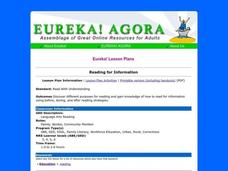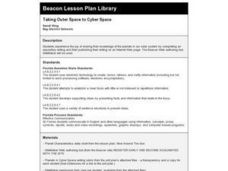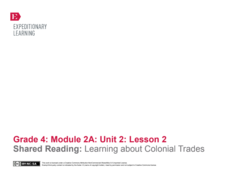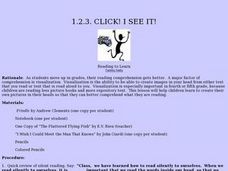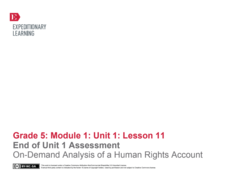Read Works
Signal Words in Expository Text
Signal words are one way that authors make the relationships between their ideas clear. Allow your learners the chance to investigate cause and effect in texts by identifying signal words. They locate and analyze cause-and-effect...
Curated OER
Reading for Information
What should readers do to prepare for reading an informational text? What should they do during their reading? What should they do after completing such a text? Introduce your pupils to reading strategies and techniques to gain meaning...
Curated OER
Identifying Important Ideas in Expository Text
Students identify the main ideas from expository text. In this main ideas lesson, students read a piece of text and practice identifying what is most important. Students complete another sample reading with a group then discuss as a class.
Curated OER
Charlotte's Web
Fourth graders focus on fluency by reading the book Charlotte's Web. For this reading strategies lesson, 4th graders partner read, do guided reading, and independent reading to increase fluency. Students use Venn Diagrams, discuss cause...
Curated OER
Short and Sweet
Students examine how to summarize information from expository text. They read an expository text and identify the important information from the reading. Students identify the topic sentence and write their own topic sentences.
Curated OER
Taking Outer Space to Cyber Space
Use the Internet, write an expository text, and have learners share their knowledge of the planets in our solar system. They compose an expository writing piece and publish it to a web page.
Curated OER
Only the Facts
Practice the strategy of summarizing to gain meaning and knowledge from an informational text. Young readers highlight supporting details and main ideas, and then they use this to summarize two articles: "The Great Quake" and "What is an...
Curated OER
Identifying Setting: Expository Writing
Your class can take turns describing a well know location or setting without giving its name, and the rest of the class can try to identify the location, based on the details given. They chart the elements that helped in the...
Curated OER
Fantastic Facts
Fourth graders are introduced to expository texts. They dwell to formulate the comprehension and gain the main ideas. Students encounter explicit comprehension strategies to help them transition into this new type of text.
Teachers.net
How to Write a Movie Review from a Pet's Perspective
When would two paws up denote a blockbuster film in your classroom? Only when young writers create movie reviews from a pet's perspective in this imaginative expository writing practice. This engaging topic begins with a class discussion...
Curated OER
Summarization Superstars
How do you read when you know you're going to be summarizing a text? Summarize a nonfiction text with your upper elementary schoolers. Your pupils independently read a nonfiction article and write a summary paragraph using the six-step...
Curated OER
Reading Comprehension
Using either online worksheets or print outs, 12th graders practice expository text comprehension skills by answering multiple choice questions, completing a vocabulary matching activity, and completing a crossword puzzle. This is...
EngageNY
End of Unit Assessment: On-Demand Informational Paragraph About How the Poison Dart Frog Survives
A final assessment marks the end of a unit that takes a close look at a variety of informational texts all about frogs. A graphic organizer aides scholars in planning an accordion paragraph using their recorder forms from previous...
EngageNY
Shared Reading: Learning About Colonial Trades
Trading in Colonial America is the focus of a lesson plan that boosts reading skills. As a class, scholars examine the informational text for crucial details, use their newfound knowledge to share information with their peers, and write...
Curated OER
Main Idea
What could you pack for a trip if you don't know the destination? After writing a list of items they would want to bring, fourth graders learn that the "trip" is to the South Pole - revealing the need to understand all available...
Curated OER
To Sum It All Up...
Students one main goal when reading is to comprehend, and one strategy to improve reading comprehension is summarization. As students begin reading expository texts, it is vital for them to be able to pick out and summarize the main...
Curated OER
Fiction vs. Nonfiction
Students explore fiction and nonfiction writing. They identify the elements of fiction in a short story and identify the criteria necessary in a nonfiction piece. Students distinguish the author's purpose in an expository text,...
Curated OER
Summing it all Up...In Your Own Words
Students observe and demonstrate the steps to identifying the main ideas of a text. They listen to the teacher read a paragraph and model the steps of summarizing the main idea. Students then independently read a different paragraph...
Curated OER
1.2.3. Click! I See It!
Young scholars listen as the teacher reads the poem 'I Wish I Could Meet the Man That Knows' by John Ciardi. They share what they visualized as the teacher read the poem. They practice reading the book "Frindle" silently while creating...
Curated OER
Exploring Literary Genre Through Latin American Literature
Young scholars explore poetry and its meaning. After reading poems, students explore the literary elements such as the setting, character, problem, events and resolution. They compare and contrast descriptions given in poems. Young...
Curated OER
What's that Mammal?
Learning by example is always effective if it's paired with independent practice opportunities! Model good reading practices for your class. Learners listen to the teacher model examples of reading with voice, expression, and tone...
Curated OER
Why?
Students discuss the concept of asking questions while reading. They discuss the types of questions to ask that will improve their comprehension. Students read from a textbook and practice creating questions to ask themselves while...
Curated OER
Sum It Up !!
Students practice various comprehension strategies to generate the main idea of the text. They encounter unfamiliar concepts and new vocabulary in their quest of the main idea in "Watson's Goes to Burmingham." The Five W's (What, Where,...
EngageNY
End of Unit 1 Assessment: On-Demand Analysis of a Human Rights Account
The last instructional activity in this unit about human rights consists of a final assessment. To demonstrate the skills your class has acquired throughout this unit, they will work with a new article entitled "From Kosovo to the United...
Other popular searches
- Expository Text Structures
- Reading Expository Text
- Expository Texts Examples
- Expository Text Features
- Expository Text Lesson Plans
- Vocabulary, Expository Text
- Examples of Expository Texts
- Summarizing Expository Texts
- Identifying Expository Texts
- Vocabulary Expository Text
- Teaching Expository Texts



